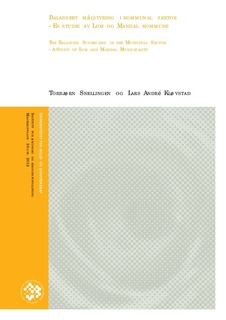| dc.description.abstract | Gjennom de siste tiårene har det skjedd store endringer i offentlig sektor. Som en del av denne utviklingen har modeller og praksiser fra det private næringsliv blitt overført til kommunal sektor. Dette har blant annet medført et økt fokus på brukerne, benchmarking,
prestasjonsmåling, delegering og et skifte mot en flatere organisasjonsstruktur. Nevnte utviklingstrekk har satt større krav til effektivitet, prestasjoner og mål- og resultatstyring i norske kommuner. Som følge av dette har det oppstått betydelige kommunale styringsutfordringer. Balansert målstyring (BM) er et styringsverktøy som har blitt benyttet for å kunne møte de økte kravene, og samtidig systematisere den komplekse styringen i kommuner. BM er med på å strukturere overordnet styring og kontroll av den operative driften, samtidig som strategisk gjennomføring sikres gjennom kobling av kortsiktige
aktiviteter og langsiktige mål. Dette gjøres gjennom et flerdimensjonalt fokus koblet opp mot visjon, strategi og overordnede mål. Gjennom BM ønskes det å omsette strategi og retning til handling gjennom dekomponerte mål satt i årsaks-virkningssammenheng. I denne oppgaven ser vi på bruk og funksjon av kommunale styringssystemer bygget på
prinsippene for BM. Dette gjøres gjennom casestudier av Lom og Mandal kommune, hvor det har blitt gjort en vurdering av kommunenes praksis sett opp imot eksisterende teori og
beslutningsgrunnlaget for innføring av BM. Gjennom bruk av dybdeintervjuer har det blitt gjort en vurdering av om systemene har en fastsatt og logisk struktur, og om det er brukt gjennomgående og kontinuerlig av og mellom de ulike nivåene i kommunene.
Resultatene fra studien har vært med på å avdekke både positive og negative forhold ved bruk og funksjon av styringssystemet i kommunene. BM har gitt et økt fokus på mål- og resultatstyring, rapportering og dialogstyring i begge kommunene. Dette får allikevel svekket verdi ettersom det synes å være en lite hensiktsmessig logisk struktur og oppbygningen av styringssystemene. Dette i form av manglende strategisk forankring, inkonsistent praksis for operasjonalisering og fraværende årsaks-virkningssammenhenger i systemet. I tillegg synes det å være manglende rutiner for opplæring som videre virker å gi
variert forståelse og kunnskap om BM i kommunene. The public sector has undergone major changes throughout the last decades. As a part of this development, models and methods has been adapted and modified to fit the municipal sector. This has resulted in an increased focus on the customers, benchmarking, performance measurement, delegation of authority and a shift toward a flat organizational structure. In regards to Norwegian municipalities these changes has further resulted in increased demands toward efficiency, performances and management by objectives and results. Major managerial challenges have occurred as a result of this. Balanced Scorecard (BSC) is a management tool that has been used to meet the increased demands and systematize the complex government of the municipalities. BSC assists in structuring supervisory control of the operative processes and also secure strategic translation by binding short-term activities to long-term objectives. This is done through multiple perspectives linked to vision and strategy. BSC translates strategy through a set of short-term goals based on hypotheses about cause-and-effect relationships.
In this master thesis we take a closer look at the use and function of municipal management system based on the principles of BSC. This is done through case studies of Lom and Mandal municipality. Each of the municipalities has been assessed in light of existing theory and the decision basis regarding the implementation of BSC. The approach of this study has been done through the use of in-depth interviews. Information provided through these interviews has been used to determine whether the systems have concise and logical structures, and how they are used throughout all levels of the municipalities. The results from this study have revealed both positive and negative aspects within the use and function of the management systems in the municipalities. BSC have both in Lom and Mandal provided an increased focus on objectives and results, informative function and dialog. Despite these advantages the management systems seem to lack suitable logical structures through missing strategic foundation, inconsistent methods of strategic translation and a lack of hypotheses about cause-and-effect relationships. Routines concerning training and education seems also to be absent and may explain the overall varying understanding and knowledge of BSC in Lom and Mandal municipality. | no_NO |
